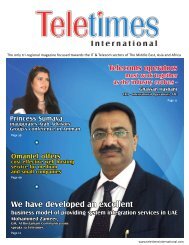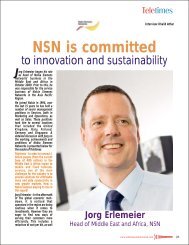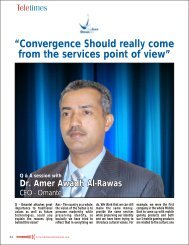Teletimes April 2011.pdf
Teletimes April 2011.pdf
Teletimes April 2011.pdf
You also want an ePaper? Increase the reach of your titles
YUMPU automatically turns print PDFs into web optimized ePapers that Google loves.
personal information for gifts,<br />
register for club memberships,<br />
sign up to receive games, and<br />
give up personal information in<br />
chat rooms. All of these information<br />
fetching techniques are<br />
affecting kids.<br />
c. Exposure to inappropriate Images<br />
and Content<br />
The open nature of Internet<br />
with regards to access of any<br />
particular type of content is<br />
what presently could be taken<br />
as a very serious challenge to<br />
protect our kids online. It’s as<br />
simple as putting a sexual word<br />
inside a search engine and getting<br />
thousands of pages inviting<br />
to browse the relevant content.<br />
This exposure to inappropriate<br />
images and content is more<br />
unsafe in developing countries<br />
like ours, where this upcoming<br />
generation of teenagers has an<br />
access to Internet at private<br />
places like net clubs with no<br />
restriction at all. Moreover, the<br />
parents generally are almost unaware<br />
of Internet and its usage;<br />
thus they are not able to guide<br />
their children about the pros and<br />
cons of open Internet access.<br />
Measuring the Child Online<br />
Safety<br />
Given the multitude of happenings<br />
and activities related<br />
to use of internet by Children,<br />
concerns in regards to sufficient<br />
and coordinated input, efficient<br />
and effective processes for child<br />
online protection arise, these<br />
concerns should enlighten us in<br />
terms of how well we are doing<br />
and what else should be done.<br />
Question arises, can we measure<br />
the efficiency and effectiveness<br />
of Child Online Safety? Here<br />
comes the critical value of “process<br />
indicators” that articulate<br />
where do we stand and how to<br />
improve on certain areas, what<br />
areas need attention and how<br />
to emphasize efficiency and<br />
effectiveness to these areas. On<br />
International forums, various<br />
discussions and methodologies<br />
are being developed on kinds of<br />
data that need to be collected,<br />
benchmarks that need to be<br />
established? All of these issues<br />
could be tackled through coordinated<br />
approach.<br />
Survey on Child Online Protection<br />
Assessment in Pakistan<br />
(Oct 2010)<br />
M/s Paradigm Technologies<br />
(private research company) carried<br />
out survey in Oct 2010 to<br />
assess and investigate Internet<br />
usage and its trends among age<br />
group of 8-18 years. The survey<br />
was carried out inline with ITU’s<br />
indicators outlined in “Child<br />
online protection CoP Initiative”.<br />
The survey also measured<br />
and evaluated online risks and<br />
opportunities.<br />
A sample size of 1,127 was<br />
considered. Sample size included<br />
717 Parents and guardians, 300<br />
teachers and 200 kids. The<br />
samples were collected through<br />
a face-to-face interaction<br />
through a survey form and also<br />
through online survey form. The<br />
key findings of the survey are<br />
summarized below along with<br />
graphical representation.<br />
According to the survey, home<br />
Internet access to children is<br />
quite high. 89% of the survey<br />
participants told that their kids<br />
in different age groups are using<br />
Internet at home. The interesting<br />
fact is that young children<br />
from 8-14 age groups are having<br />
a growing usage pattern for the<br />
Internet which shows a requirement<br />
for evaluating the ‘Child<br />
Online Protection’ policy framework<br />
inside the country.<br />
Several questions were asked<br />
to measure the level of attention<br />
parents confer to assess the<br />
online activities of their children.<br />
Responses show that generally<br />
parents are not attentive<br />
towards the online issues that<br />
are putting their children at risk.<br />
They are also not interested in<br />
monitoring their children online<br />
habits at large, the primary reason<br />
behind could be the lack of<br />
time and lack of general awareness<br />
among the parents. This<br />
really is an alarming situation<br />
requiring immediate intervention<br />
from both public and<br />
private institutes to enable safe<br />
Internet access to our young<br />
users.<br />
A couple of questions were<br />
exclusively asked from the<br />
kids to judge their Internet<br />
activities, frequency of their<br />
Internet activities and about<br />
their contact with inappropriate<br />
online content. The kids were<br />
mainly segregated as daily and<br />
weekly users. Results indicate<br />
that children between the age of<br />
8-18 years use Internet on daily<br />
or weekly basis, 88% use it to<br />
do school / college work, 82%<br />
for playing online games and<br />
78% use it to get information<br />
for other things.<br />
Almost six out of every ten,<br />
cumulatively (53%) have come<br />
in contact with pornography,<br />
34% have accidently found<br />
themselves on a pornographic<br />
website, 31% received pornographic<br />
junk mail by email or<br />
messenger and 30% have seen a<br />
pornographic pop-up advertisement<br />
while browsing Internet<br />
sites.<br />
In order to verify the interest of<br />
the parents to monitor online<br />
activities of their children and<br />
the assumptions in children’s<br />
mind, few questions were asked.<br />
Parents are generally unaware<br />
of their responsibility to manage<br />
their children’s internet use, only<br />
31% of them ask their children<br />
about their online activities, or<br />
monitor it themselves. Similarly<br />
responses of children also imply<br />
that their parents are not much<br />
bothered about their Internet<br />
usage.<br />
The last question of the survey<br />
inquired as what would be the<br />
priority action that they want to<br />
15Apr - 14May 2011<br />
www.teletimesinternational.com<br />
13

















